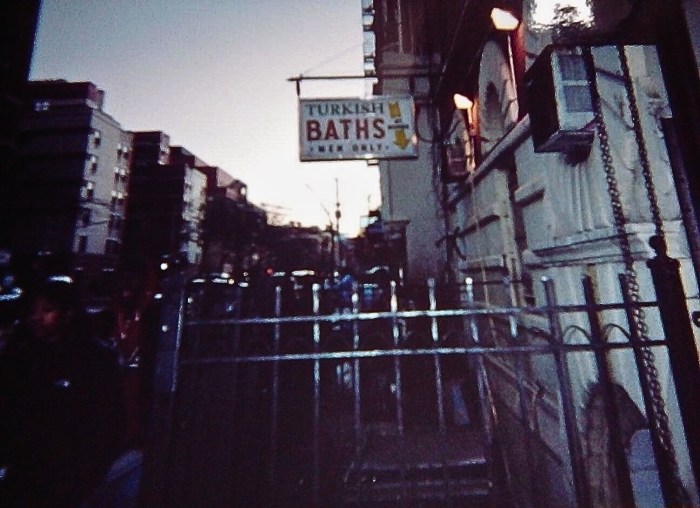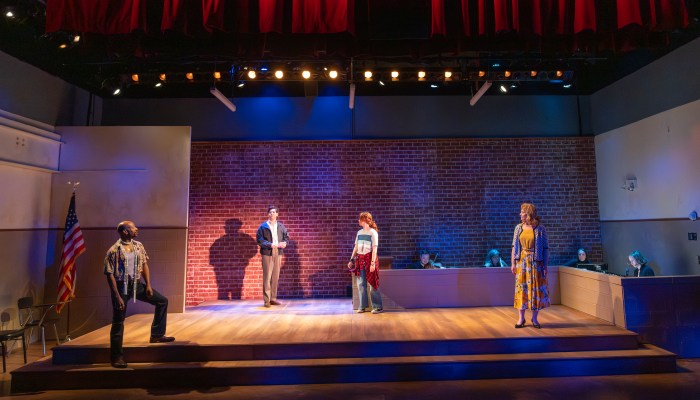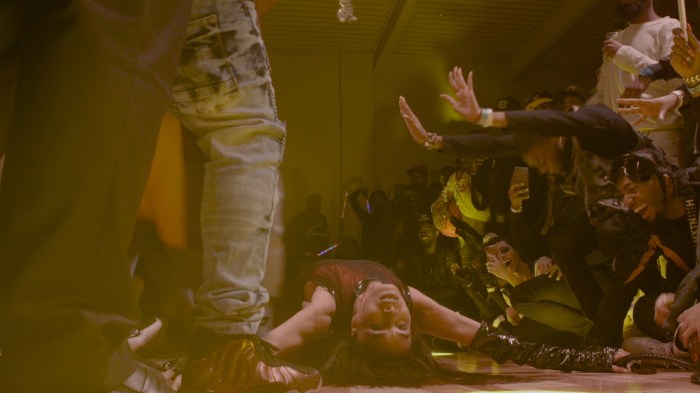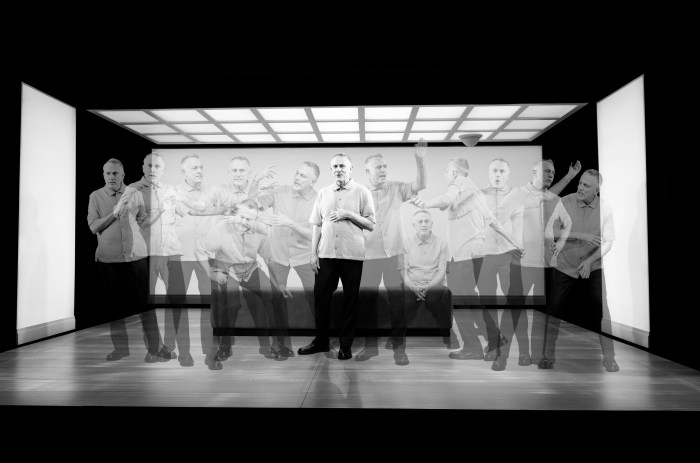Three excellent nonpareil vocal recitals; some CD gift suggestions
The vocal recital, which calls on totally different gifts and appeals to generally different tastes than staged opera, is regularly proclaimed an endangered species. Sometimes presenters have been hauling out “celebrity appearance” type of programming, with famous recording star divas and divos trotting through well-known chestnuts before turning to arias with piano. Fortunately, besides some excellent singers still devoted mainly to the recital format (Tully headlines Christoph Prégardien, March 9, and Matthias Goerne, April 12), there remain some singers equally adept at both art forms. New York heard three of them in the last few weeks (and would have heard another had not Sandrine Piau fallen ill). The most publicized and (at least formally) extraordinary appearance was that by British baritone Simon Keenlyside in Trisha Brown’s staging of Schubert’s Die Winterreise at the John Jay College Theatre. Brown and her acclaimed dancers had worked with Keenlyside before on Monteverdi’s Orfeo; the athletic baritone, quietly sexy in the manner of one of today’s “sensitive” television stars, proved so adept at movement that he asked the choreographer to add a dancing and scenic dimension to Schubert’s craggy cycle, of which he is already an acclaimed interpreter. Winterreisen are hardly rare (José van Dam offered New York a reputedly excellent one in November); and even staged ones are gaining in popularity (a recent Robert Wilson/Jessye Norman collaboration in Paris actually found Parisians booing both of these monstres sacrées. I am not sure that (in the final analysis) it is not just a sign of our relentlessly visual age to want to augment what can be a riveting musical, textual, and psychological experience with just a singer and pianist, but the Brown/Keenlyside collaboration was certainly worth seeing, and probably about as satisfactory as any such enterprise could be. Trisha Brown’s work is always visually striking, and the images made by Keenlyside and the three fine dancers (Brandi L. Norton, Seth Parker, Lionel Popkin) were often very striking. Some had a realistic or imagistic relation to the text and some did not. Keenlyside was announced as indisposed December 9, and some of the poses did not make it easy for him to produce his voice under these circumstances. Sometimes hearing someone perform ill reaffirms that he really knows how to sing, and on this occasion one could hear through the difficulties how vocally and musically fine a cycle the baritone can muster. (May he take it into the recording studio soon.) Pianist Pedja Muzivejic (not called upon to dance) proved a flexible and sonorous accompanist. Jennifer Tipton deserved a special bow for her stunning lighting. The Tully recital (December 8) by Gerald Finley, his first at Lincoln Center, showed an admirable willingness to explore unfamiliar repertory; the only staple was the exquisite, always welcome “L’invitation au voyage” as part of a group of four Duparc chansons. Good Canadian that he is, Finley (whose most striking local appearance heretofore was as Papageno at the Met) offered English and French songs (with one tantalizing Wolf lied in German as an encore.) He and the superb Julius Drake at the piano explored a program about travel and wandering. It’s hard not to think “manly” when hearing (and seeing) Finley: his is a very fine, straightforward lyric baritone with excellent clear diction, and the presence is confident but appealing. All those holding forth about how Brian Stokes Mitchell is the last remaining exponent of the John Raitt and Alfred Drake repertory might want to save their ink until Finley ventures a “classic Broadway” album. Meanwhile, despite a seeming slight indisposition causing a number of hairline cracks in otherwise clean and strong vocalism, he gave a lot of pleasure as a singer of songs. Bryn Terfel probably has this generation’s franchise on Vaughn Williams’ “Songs of Travel”, but Finley did five of them very well. Much as I love Britten (to say nothing of Blake) I can’t venture much enthusiasm for his arid “Songs and Proverbs of William Blake”, an endless fourteen-song cycle over which the Higher Worthiness of its original exponent, Dietrich Fischer-Dieskau, hovers like a shroud. Drake was particularly impressive here, as the piano line outstrips the vocal line in interest. After the lovely Duparc group, a Barber cycle in French proved diverting, as did Noel Coward’s “I Travel Alone”, delivered with panache and pathos. Finley scored a success—with the British musical press, at any rate—in Mark-Anthony Turnage’s opera The Silver Tassie, and he duly offered up two selections by this composer whose musical merits utterly elude me. To paraphrase Bernard Shaw, we should no more be asked to carry aloft the Turnage tassie (cup) than the Brits should have to endure the tread of Heggie’s dead man. Finley is however an exceptionally fine singer, and I hope to hear him back in New York often, and in a wide repertory. The same holds true for the Alaskan mezzo Vivica Genaux, whose wonderful recital appearance in Carnegie’s Weill Hall (December 13) made me regret that this engaging (not to mention drop-dead gorgeous) American singer is chiefly active in Europe these days. Once again, the program was amazingly unhackneyed: with the exception of the Rossini Canzonetta spagnuola and a spiffy zarzuela aria about a tarantula that de los Angeles and Verrett used to do, I’d never heard any recitalist sing anything that Genaux tackled. Her easy trills and breath control in her opening Porpora numbers (also on her current award-winning CD) were pretty staggering. She dispatched three rarities by Pauline Viardot-Garçia with accomplishment and charm. There is a marked vibrato in her tone that might not be to all tastes (and occasionally, on high loud notes, crosses over into tremolo), but it serves the Spanish repertoire very well. Partly of Mexican heritage, she really “owns” her Spanish declamation, but she proved adept in French and German too. Rather than yet another traversal of Schumann’s Frauenliebe she gave a sensitive traversal of Carl Loewe’s rarely done version—quite affecting, with a concluding song that Schumann declined to set. Craig Rutenberg is a gifted and supportive accompanist, but on this occasion, he didn’t sound quite on top of every detail in some of the more obscure pieces. It would be good to hear Genaux locally in some Handel roles. In the meantime, these three singers take part in three highly recommended holiday gifts: Keenlyside in Gluck’s ravishing Iphigénie en Tauride, everyone’s favorite gay-themed opera from 1779 (!), splendidly led by Marc Minkowski (Archiv, $28); Finley in Handel’s gorgeous Rinaldo, with Cecilia Bartoli, David Daniels, and Bernarda Fink—a real summit conference of today’s great singers (Oiseau Lyre, $42); and Genaux’s brilliantly exciting Arias for Farinelli led by René Jacobs (Harmonia Mundi, $15).


































